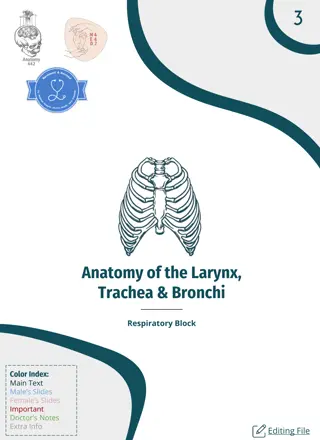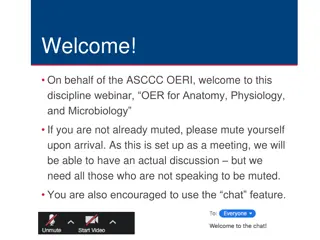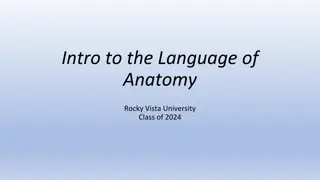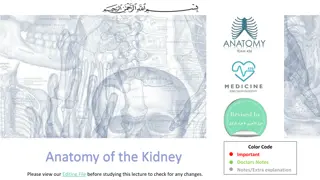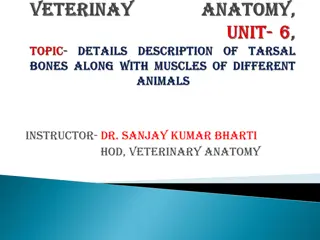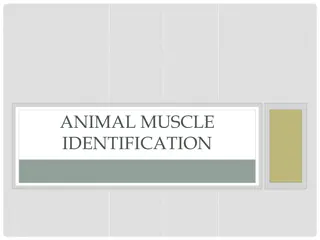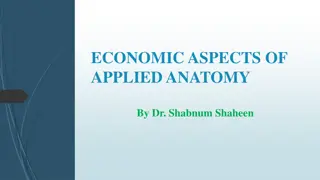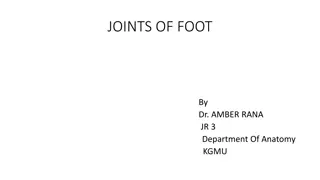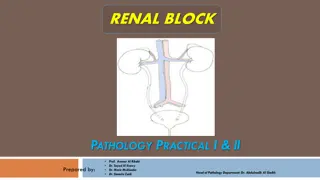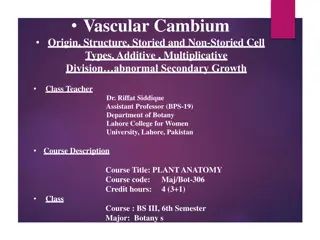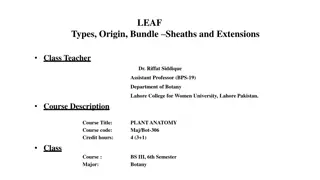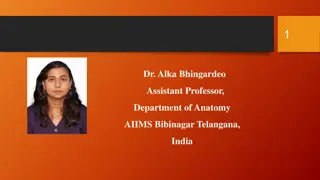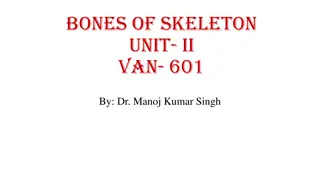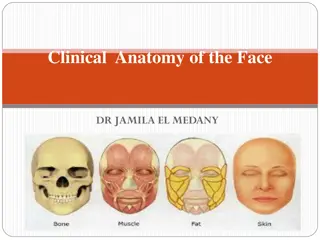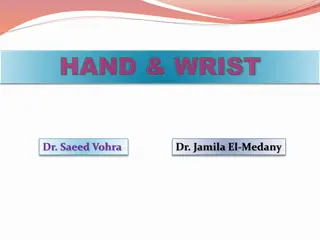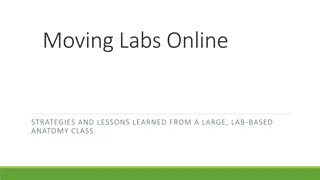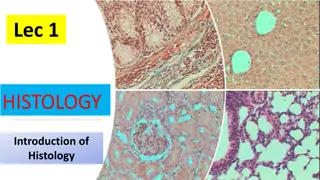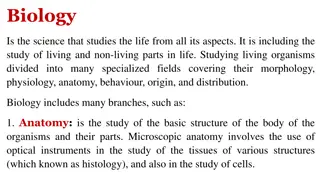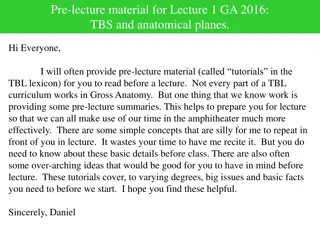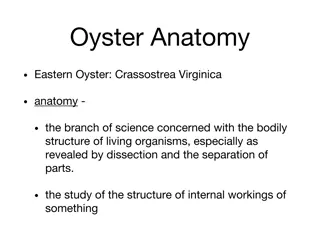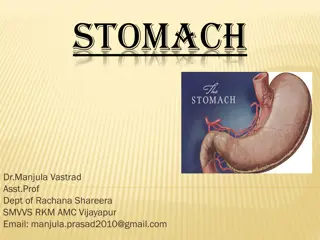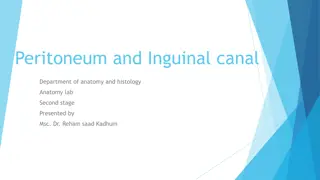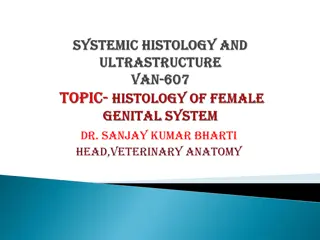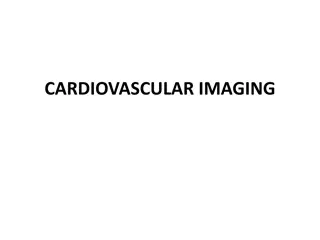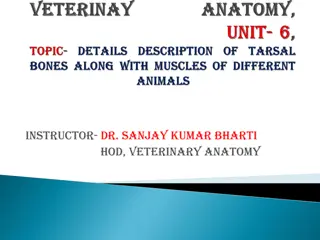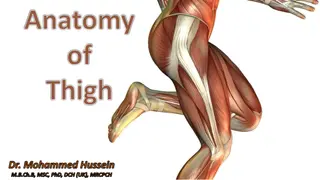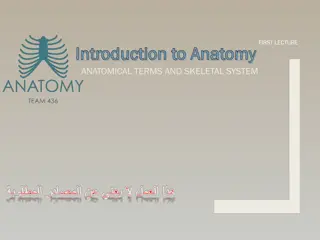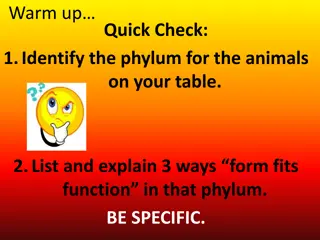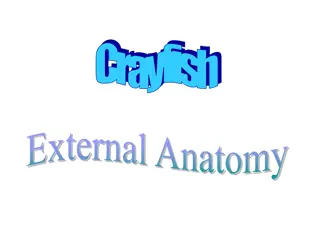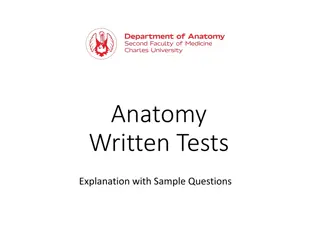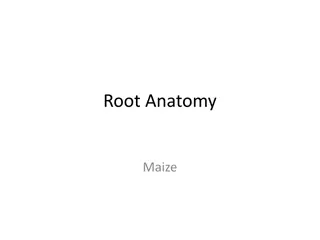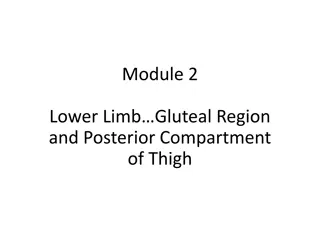Anatomy of the Larynx, Trachea, and Bronchi: Respiratory System Overview
The larynx, trachea, and bronchi are vital structures of the respiratory system with distinct functions and anatomy. The larynx houses vocal cords, aids in breathing, voice production, and swallowing. It is interconnected with major arteries, veins, and nerves in the neck. The trachea extends from t
12 views • 19 slides
Periodontal and Peri-Implant Surgical Anatomy Overview
Sound knowledge of the anatomy of the periodontium and surrounding tissues is essential for successful periodontal and implant surgical procedures. This includes understanding the mandible and maxilla anatomy, muscles, anatomic spaces, and landmarks like the mandibular canal. Proper awareness can he
9 views • 41 slides
Anatomy of Intestine in Domestic Animals
The intestine in domestic animals plays a vital role in digestion and absorption. It consists of the small intestine for chemical digestion and absorption and the large intestine for water absorption and excretion. This article covers the gross anatomy, histology, and embryology of the intestine, de
2 views • 84 slides
ASCCC OERI Webinar on OER for Anatomy, Physiology, and Microbiology
Welcome to the ASCCC OERI webinar focused on Open Educational Resources (OER) for Anatomy, Physiology, and Microbiology. This event discusses the adoption of OER in California Community Colleges, challenges faced in Anatomy and Physiology, available resources, and potential strategies to increase OE
0 views • 20 slides
Anatomy Basics for Rocky Vista University Class of 2024
Explore the fundamental concepts of anatomy with this informative presentation designed to help students engage in lectures effectively. Covering body systems, from integumentary to circulatory, this guide ensures a solid foundation for anatomy studies. Essential terms and systems are explained to a
0 views • 103 slides
Understanding the Anatomy of the Kidney
The lecture covers the shape, position, surface anatomy, external features, hilum and its contents, relations, internal structure, blood supply, lymph drainage, and nerve supply of the kidney. It also discusses the functions of the kidney, its position in the body, and the structures surrounding it.
2 views • 22 slides
Fossil Plants: Sphenophyllum and Zygopteris Anatomy
Dr. Jithesh Krishnan R, Asst. Prof. at NSS College, Pandalam, specializes in studying Fossil Pteridophytes like Sphenophyllum and Zygopteris. These ancient plants date back to the Devonian period and showcase unique stem anatomy resembling roots. Sphenophyllum had slender shoots with whorled leaves,
0 views • 11 slides
Understanding Tarsal Bone Anatomy in Veterinary Science
Tarsal bones in veterinary anatomy play a crucial role in the structure of an animal's hind limbs. Comprising five short bones arranged in distinct rows, including the tibial, fibular, and central tarsals, the tarsus supports movement and stability. The largest tarsal, known as the calcaneal tubercl
1 views • 24 slides
Animal Muscle Identification and Anatomy Diagrams
This collection includes detailed diagrams showcasing the identification and anatomy of muscles in animals, specifically focusing on pig muscle anatomy. From head and neck muscles to arm and shoulder muscles, pelvis and thigh muscles, and trunk muscles, these visual aids help understand the structur
3 views • 26 slides
Economic Aspects of Applied Plant Anatomy in Practical Use
Applied Plant Anatomy involves the practical application of anatomical knowledge in various fields such as identification, classification, taxonomic applications, medicinal plants, food safety, wood analysis, forensic investigations, and more. By understanding plant anatomy, professionals can utiliz
0 views • 26 slides
Overview of Foot Joints and Bones: Anatomy and Movements
Foot anatomy involves 26 bones forming various joints like interphalangeal, metatarso-phalangeal, and tarso-metatarsal joints. Ligaments and movements at these joints play crucial roles in foot function. Understanding the structure and function of these joints is essential for medical professionals
2 views • 19 slides
Anatomy of the Ox Radius: Structure and Function
The radius of an ox is the larger and shorter bone of the forearm, situated between the elbow and carpal joints. It consists of a shaft with distinct surfaces and borders, facilitating muscle attachments and joint movements in the forelimb. The proximal extremity articulates with the humerus, while
0 views • 11 slides
Renal Block Pathology Practical: Anatomy and Histology Overview
The Renal Block Pathology Practical provides a comprehensive insight into the anatomy, structure, and histology of the kidney nephrons, including normal and abnormal conditions such as acute kidney injury. The session covers topics like the structure of the nephron, normal kidney gross anatomy, rena
3 views • 47 slides
Understanding Vascular Cambium in Plant Anatomy
Vascular cambium is a crucial growth layer in stems and roots, responsible for producing xylem and phloem in plants. It originates from the maturation of procambium cells, differentiating into storied and non-storied cell types. It plays a vital role in secondary growth by generating new wood in woo
0 views • 26 slides
Understanding the Anatomy of a Leaf in Plant Biology
The anatomy of a leaf in plant biology is essential for understanding its structure and functions in photosynthesis and transpiration. This article explores the different parts of a leaf, including the leaf base, petiole, and lamina, as well as the types of leaves and venation patterns. By delving i
0 views • 29 slides
Dr. Alka Bhingardeo - Assistant Professor of Anatomy at AIIMS Bibinagar, India
Dr. Alka Bhingardeo is an accomplished Assistant Professor of Anatomy at AIIMS Bibinagar, India, with extensive qualifications and experience in the field. She has presented at prestigious conferences like the Second World Congress of Anatomy in Rome and has a strong focus on research, student welfa
0 views • 7 slides
Understanding Anatomy: Branches and Components of the Human Body
Anatomy, the study of body tissue structures, encompasses various branches including Gross Anatomy, Systematic Anatomy, and Microscopic Anatomy. Osteology focuses on the skeleton's components and functions as a crucial support system for the body, aiding in movement and protection of organs.
5 views • 12 slides
Sexual and Reproductive Anatomy Lesson for 5th Grade
Explore the essential aspects of male and female sexual and reproductive anatomy in this detailed 5th-grade lesson from the Rights, Respect, Responsibility sexuality education curriculum. The images provided offer a visual guide to understanding external female anatomy and reproductive anatomy, aidi
0 views • 5 slides
Clinical Anatomy and Muscles of the Face Explained
Detailed information on the clinical anatomy of the face, covering the skin's criteria, skin tension lines, muscles of facial expression, muscles acting on the forehead, muscles of the eyelids, and muscles of the mouth. Understand the structure, function, and importance of each component in facial a
0 views • 34 slides
Understanding the Anatomy of the Hand and Wrist
Explore the intricate anatomy of the hand and wrist, including structures like the flexor and extensor retinaculae, carpal tunnel, and palmar aponeurosis. Learn about the functions and attachments of these vital components to enhance your knowledge of hand and wrist anatomy.
0 views • 24 slides
Strategies and Lessons Learned for Moving Anatomy Labs Online
Explore strategies, challenges, and tips for transitioning large lab-based anatomy classes online. Discuss considerations, effective delivery options, assessment methods, and examples like Human Anatomy activities. Learn from an Associate Professor's experience teaching human anatomy and physiology
0 views • 13 slides
Introduction to Histology and Microscopy in Anatomy
Histology is the study of tissue structure and function in animals and plants, focusing on the microscopic structure of cells, tissues, and organs. It helps in understanding the relationship between structure and function, intertwining disciplines like cell biology, pathology, physiology, and bioche
0 views • 5 slides
Exploring the Fascinating World of Biology and Human Biology
Biology is a broad scientific field encompassing the study of living organisms and their various aspects, from anatomy and physiology to genetics and evolution. Branches of biology include anatomy, histology, cytology, physiology, embryology, genetics, molecular biology, biochemistry, zoology, botan
0 views • 21 slides
Pre-Lecture Material for Gross Anatomy: TBS and Anatomical Planes
Understand the Typical Body Segment (TBS) concept, a transverse section through the human body, and the importance of anatomical planes for orienting and dividing the body into sagittal, coronal, and transverse sections. Prepare effectively for Gross Anatomy lectures by grasping these foundational c
0 views • 6 slides
Understanding the Thoracic Cage and Respiratory Movements in Anatomy Lecture
Professor Ahmed Fathalla Ibrahim, a renowned Professor of Anatomy at King Saud University, covers the components of the thoracic cage, articulations, respiratory movements, and muscles involved in breathing in this informative lecture. Learn about the structure of the thoracic cage, articulations li
0 views • 24 slides
Exploring the Anatomy of Eastern Oysters: A Detailed Study
Delve into the intricate anatomy of the Eastern Oyster (Crassostrea Virginica) through dissection and examination of its external and internal structures. Discover the fascinating details of oyster artifacts and evidence of organisms that coexisted with these marine creatures.
0 views • 36 slides
Understanding the Anatomy of the Stomach
The stomach, also known as the gaster or venter, is a vital organ in the digestive system. It is a muscular bag that plays a crucial role in food digestion and absorption. This article covers the surface anatomy, external and internal features, blood supply, nerve supply, lymphatic drainage, clinica
0 views • 32 slides
Understanding Peritoneum and Inguinal Canal in Anatomy
Peritoneum is a thin serous membrane covering the abdomen and pelvis, consisting of parietal and visceral layers with a peritoneal cavity between them. Learn about peritoneal relations, intraperitoneal versus retroperitoneal organs, and folds of peritoneum like ligaments and omenta in this detailed
0 views • 21 slides
Female Genital Organs: Ovaries and Anatomy Overview
This informative presentation covers the anatomy of female genital organs, focusing on the ovaries. It explains the functions of the ovaries, their structure, and the various stages of ovarian follicle development. Dr. Sanjay Kumar Bharti's expertise in veterinary anatomy is highlighted through deta
0 views • 15 slides
Comprehensive Guide to Cardiovascular Imaging and Anatomy
Explore a detailed collection of images showcasing cardiovascular imaging, radiological anatomy of the chest, vascular anatomy, and pulmonary conditions like embolism. Discover the gold standard for diagnosing pulmonary embolism, as well as CT angiograms and aortic arch anatomy. Engage with visuals
0 views • 59 slides
Veterinary Anatomy: Tarsal Bone Structure and Function
The veterinary anatomy lesson delves into the intricacies of the tarsal bone in oxen, detailing its composition, arrangement of short bones, and specific features like the tuber calcis and articulation points. The tarsus comprises different rows of bones, each serving a specific function in locomoti
0 views • 24 slides
Comprehensive Overview of Thigh Anatomy by Dr. Mohammed Hussein M.B.Ch.B, MSC, PhD
Dr. Mohammed Hussein provides a detailed exploration of the anatomy of the thigh, covering regional anatomy, connections, compartments, and cutaneous nerves. The discussion delves into the front and medial aspects of the thigh, offering valuable insights for medical professionals and enthusiasts ali
0 views • 74 slides
Introduction to Anatomy: Anatomical Terms and Skeletal System
An introduction to anatomy covering anatomical terms and the skeletal system. It defines anatomy, explains anatomical sciences, discusses the skeletal system, and outlines anatomical terminology including terms of position. The content includes objectives, classifications of bones, and different ana
0 views • 28 slides
Exploring Crayfish Anatomy and Adaptations in Biology Lab
Explore the fascinating world of crayfish anatomy and adaptations through hands-on dissection activities in a biology lab setting. Identify phylum, examine external anatomy, study compound eyes, and delve into the function-form relationship within the phylum. Engage in interactive tasks like drawing
0 views • 22 slides
Crayfish External Anatomy: A Detailed Exploration
Discover the external anatomy of a crayfish through detailed descriptions and images. Explore the dorsal and ventral views, diving into the features such as uropods, telson, chelipeds, antennae, swimmerets, and more. Learn about the mouth area, including walking legs, maxillipeds, mandibles, and sen
0 views • 22 slides
Anatomy Written Tests Overview with Sample Questions
Explore different types of anatomy questions commonly seen in written tests, including general anatomy, structural anatomy, functional anatomy, topographical anatomy, imaging anatomy, clinical anatomy, microscopic anatomy, and embryo-related topics. Sample questions and answers are provided for each
0 views • 12 slides
Maize Root Anatomy: An In-depth Examination
Maize root anatomy involves various specialized structures such as the epidermis, cortex, endodermis, pericycle, and vascular tissue. The epidermis is crucial for absorption and protection, while the cortex plays a role in providing support and storage. The endodermis acts as a barrier and regulates
0 views • 9 slides
Anatomy Multiple Choice Questions on Hand Structures
Test your knowledge of hand anatomy with these multiple-choice questions covering palmar fascial spaces, synovial sheaths, and other hand structures. Identify spaces, boundaries, and contents while learning about the intricacies of hand anatomy.
0 views • 7 slides
Understanding Hemorrhoids: Anatomy, Types, and Treatment
The anal canal anatomy, including internal and external sphincters, blood supply, and classification of internal hemorrhoids are detailed in this informative content. Hemorrhoids, categorized as internal or external, vary in location, symptoms, and treatment options. Understanding the anatomy and ty
0 views • 48 slides
Comprehensive Study of Lower Limb Anatomy and Function
Explore the detailed anatomy of the gluteal region, posterior compartment of the thigh, blood vessels, nerves, and muscles of the lower limb. Learn about dermatomes, communication areas, muscle actions, Trendelenburg gait, and more. This educational resource is part of a pedorthic program of study f
0 views • 14 slides
